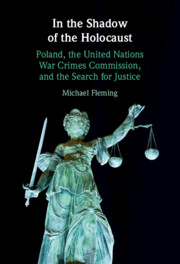‘At a time when the Polish government seems intent on seizing the property of long-dead Jews, Michael Fleming's book provides vital fresh insights - challenging the idea of universal hostility of Christian Poles for the Jewish countryfolk. Using long secret archives of Polish efforts to get Nazis into court for the Holocaust, Fleming has constructed a factual account as gripping as any from Ian Fleming, his spy-fiction writing namesake.’
Dan Plesch - author of Human Rights After Hitler
‘This pathbreaking book sheds important new light on post-war attempts to prosecute Nazi war criminals and collaborators through an analysis of the participation in the United Nations’ War Crimes Commission of representatives of the Polish government, first that established in the west after the Polish defeat and then by the pro-communist government established by the Soviets. It is essential reading for all those interested in the problem of how to prosecute genocide and crimes against humanity.’
Antony Polonsky - Emeritus Professor of Holocaust Studies, Brandeis University
'Of the forty-seven members of my immediate family, only three women and I survived the Holocaust. I read Michael Fleming’s new work first and foremost as a historian, but I cannot completely free myself from emotion. Information about the fate of hundreds of thousands of families like mine reached Western public opinion during the war with difficulty, with resistance and… with brakes. Michael Fleming wrote about this in his excellent work Auschwitz, the Allies and Censorship of the Holocaust. In the latest book, we have a kind of follow-up: how a “minor” Ally, but the first to offer armed resistance to German fascism - Poland - tried to sensitise the Allies to the problem of criminal responsibility for the crime of genocide and the Holocaust. And it is no coincidence that this “minor” Ally produced outstanding lawyers who had something new to say in this area. Michael Fleming’s In the Shadow of the Holocaust is not only an insightful study of the past, it is also a warning against - God forbid - a repetition in the future.'
Marian Turski - President of the International Auschwitz Committee
‘… an important asset to all who are interested in the Holocaust and World War II.’
Robbie Sabel
Source: Israel Journal of Foreign Affairs
‘In his detailed study, Fleming succeeds in tracing the diverse initiatives that, in the midst of the Second World War, pushed for the restoration of the rule of law and the punishment of Nazi criminals - and in doing so also takes into account the important contribution of the lawyers associated with Poland who 'helped to lay the foundations for the rule of law in the post-war period'.’
Klaus-Peter Friedrich
Source: Zeitschrift für Genozidforschung



